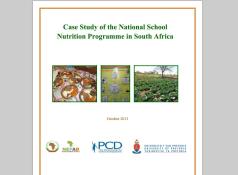 South Africa's School Nutrition Programme Case Study
South Africa's School Nutrition Programme Case Study
 South Africa's National School Nutrition Programme (NSNP) Case Study showcases best practices as well as challenges that the programme has experienced during its implementation to broaden the evidence base so measures are put in place to further the efficiency of the programme. The study was undertaken during 2012 in 12 schools, across two provinces: the Eastern Cape and Mpumalanga by the South African Department of Basic Education, the Partnership for Child Development and the New Partnership for Africa’s Development.
South Africa's National School Nutrition Programme (NSNP) Case Study showcases best practices as well as challenges that the programme has experienced during its implementation to broaden the evidence base so measures are put in place to further the efficiency of the programme. The study was undertaken during 2012 in 12 schools, across two provinces: the Eastern Cape and Mpumalanga by the South African Department of Basic Education, the Partnership for Child Development and the New Partnership for Africa’s Development.
The NSNP was established in 1994 as one of the first initiatives of the first post apartheid democratic Government of South Africa and initially focused on primary school learners but currently also caters for secondary school learners and provides meals to nearly nine million learners per school day in all nine provinces of the country. The programme serves one cooked meal that consists of a protein dish, a starch and a fresh vegetable to each learner, and is fully funded by the Government through a Conditional Grant and targets schools with learners from disadvantaged communities. Three pillars form the basis of the programme namely: school feeding, nutrition education and establishment and the maintenance of food gardens in schools.




